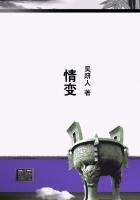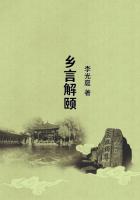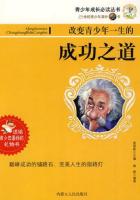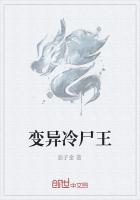"Paradise is under the shadow of swords."
_Mahomet_
Ruby wine is drunk by knaves, Sugar spends to fatten slaves, Rose and vine-leaf deck buffoons;
Thunderclouds are Jove's festoons, Drooping oft in wreaths of dread Lightning-knotted round his head;
The hero is not fed on sweets, Daily his own heart he eats;
Chambers of the great are jails, And head-winds right for royal sails.
ESSAY VIII _Heroism_
In the elder English dramaetcher, there is a constant recognition of gentility, as if a noble behaviour were as easily marked in the society of their age, as color is in our American population. When any Rodrigo, Pedro, or Valerio enters, though he be a stranger, the duke or governor exclaims, This is a gentleman, -- and proffers civilities without end; but all the rest are slag and refuse. In harmony with this delight in personal advantages, there is in their plays a certain heroic cast of character and dialogue, -- as in Bonduca, Sophocles, the Mad Lover, the Double Marriage, -- wherein the speaker is so earnest and cordial, and on such deep grounds of character, that the dialogue, on the slightest additional incident in the plot, rises naturally into poetry. Among many texts, take the following. The Roman Martius has conquered Athens, -- all but the invincible spirits of Sophocles, the duke of Athens, and Dorigen, his wife. The beauty of the latter inflames Martius, and he seeks to save her husband; but Sophocles will not ask his life, although assured that a word will save him, and the execution of both proceeds.
"_Valerius_. Bid thy wife farewell.
_Soph_. No, I will take no leave. My Dorigen, Yonder, above, 'bout Ariadne's crown, My spirit shall hover for thee. Prithee, haste.
_Dor_. Stay, Sophocles, -- with this tie up my sight;
Let not soft nature so transformed be, And lose her gentler sexed humanity, To make me see my lord bleed. So, 't is well;
Never one object underneath the sun Will I behold before my Sophocles:
Farewell; now teach the Romans how to die.
_Mar_. Dost know what 't is to die?
_Soph_. Thou dost not, Martius, And, therefore, not what 't is to live; to die Is to begin to live. It is to end |P372|p1
An old, stale, weary work, and to commence A newer and a better. 'T is to leave Deceitful knaves for the society Of gods and goodness. Thou thyself must part At last from all thy garlands, pleasures, triumphs, And prove thy fortitude what then 't will do.
_Val_. But art not grieved nor vexed to leave thy life thus?
_Soph_. Why should I grieve or vex for being sent To them I ever loved best? Now I'll kneel, But with my back toward thee; 't is the last duty This trunk can do the gods.
_Mar_. Strike, strike, Valerius, Or Martius' heart will leap out at his mouth:
This is a man, a woman! Kiss thy lord, And live with all the freedom you were wont.
O love! thou doubly hast afflicted me With virtue and with beauty. Treacherous heart, My hand shall cast thee quick into my urn, Ere thou transgress this knot of piety.
_Val_. What ails my brother?
_Soph_. Martius, O Martius, Thou now hast found a way to conquer me.
_Dor_. O star of Rome! what gratitude can speak Fit words to follow such a deed as this?
_Mar_. This admirable duke, Valerius, With his disdain of fortune and of death, Captived himself, has captivated me, And though my arm hath ta'en his body here, His soul hath subjugated Martius' soul.
By Romulus, he is all soul, I think;
He hath no flesh, and spirit cannot be gyved;
Then we have vanquished nothing; he is free, And Martius walks now in captivity."
I do not readily remember any poem, play, sermon, novel, or oration, that our press vents in the last few years, which goes to the same tune. We have a great many flutes and flageolets, but not often the sound of any fife. Yet, Wordsworth's Laodamia, and the ode of "Dion," and some sonnets, have a certain noble music; and Scott will sometimes draw a stroke like the protrait of Lord Evandale, given by Balfour of Burley. Thomas Carlyle, with his natural taste for what is manly and daring in character, has suffered no heroic trait in his favorites to drop from his biographical and historical pictures. Earlier, Robert Burns has given us a song or two. In the Harleian Miscellanies, there is an account of the battle of Lutzen, which deserves to be read. And Simon Ockley's History of the Saracens recounts the prodigies of individual valor with admiration, all the more evident on the part of the narrator, that he seems to think that his place in Christian Oxford requires of him some proper protestations of abhorrence. But, if we explore the literature of Heroism, we shall quickly come to Plutarch, who is its Doctor and historian. To him we owe the Brasidas, the Dion, the Epaminondas, the Scipio of old, and I must think we are more deeply indebted to him than to all the ancient writers. Each of his "Lives" is a refutation to the despondency and cowardice of our religious and political theorists. A wild courage, a Stoicism not of the schools, but of the blood, shines in every anecdote, and has given that book its immense fame.
We need books of this tart cathartic virtue, more than books of political science, or of private economy. Life is a festival only to the wise. Seen from the nook and chimney-side of prudence, it wears a ragged and dangerous front. The violations of the laws of nature by our predecessors and our contemporaries are punished in us also.
The disease and deformity around us certify the infraction of natural, intellectual, and moral laws, and often violation on violation to breed such compound misery. A lock-jaw that bends a man's head back to his heels, hydrophobia, that makes him bark at his wife and babes, insanity, that makes him eat grass; war, plague, cholera, famine, indicate a certain ferocity in nature, which, as it had its inlet by human crime, must have its outlet by human suffering. Unhappily, no man exists who has not in his own person become, to some amount, a stockholder in the sin, and so made himself liable to a share in the expiation.















